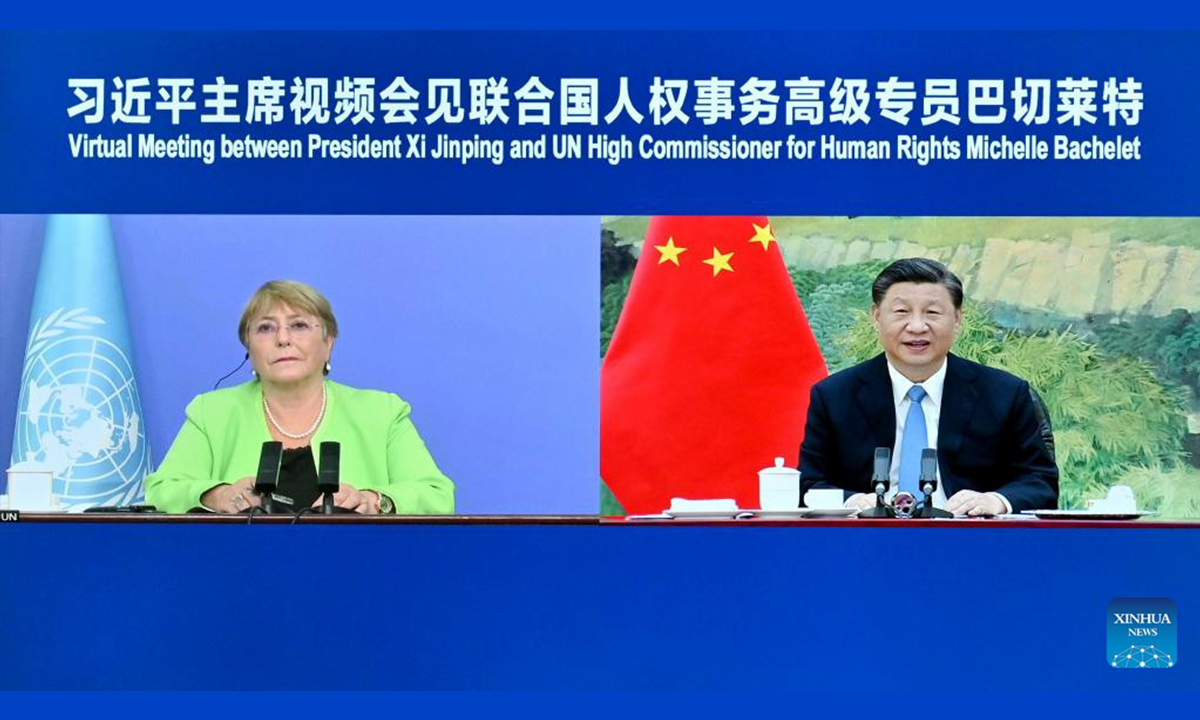
Chinese President Xi Jinping holds a meeting with United Nations High Commissioner for Human Rights Michelle Bachelet via video link in Beijing, capital of China, May 25, 2022. Photo:Xinhua
By stressing her trip is not an investigation, UN human rights chief Michelle Bachelet ended her six-day visit in China and its Xinjiang region with a statement on Saturday night and said her mission had wide and open discussions with people from different sectors in the region, including prisoners and former trainees of vocational education and training centers and all these meetings were organized by her delegation.
The Saturday statement dismissed the rampant disinformation on the Xinjiang region and was also a slap to the US and some Western countries, their media and anti-China forces. Before and during Bachelet's visit to China's Xinjiang region, the US and some Western countries, together with anti-China forces are busying in questioning and opposing Bachelet's visit - a U-turn from their previous vehement call for UN human rights chief's visit. Analysts said that with their lies of the century, especially the "genocide" allegation going to be debunked via Bachelet's visit, the US and anti-China forces are increasing pressure on Bachelet and finding the ladder to continue their lies.
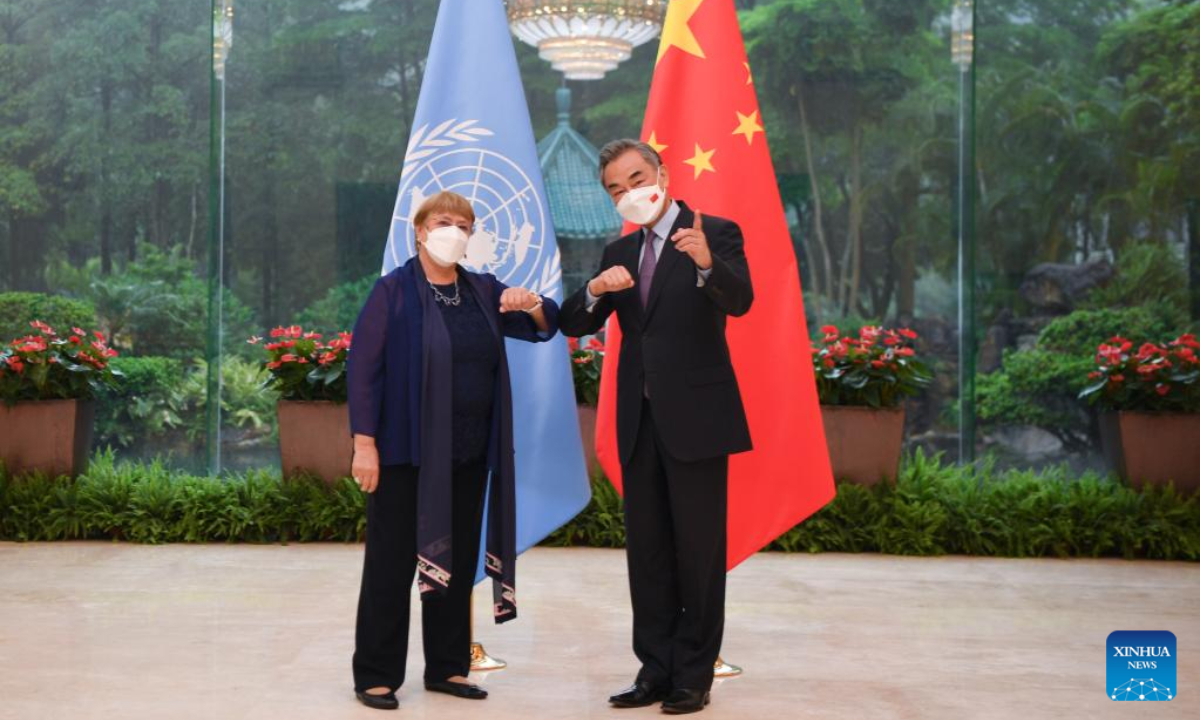
Chinese State Councilor and Foreign Minister Wang Yi meets with the United Nations High Commissioner for Human Rights Michelle Bachelet in Guangzhou, south China's Guangdong Province, May 23, 2022. Photo:Xinhua
Bachelet said at the Saturday press conference that they had conversations with people from different sectors, including senior officials from Xinjiang, local ethnic residents, academics, religious leaders, visited a prison to talk with inmates, and went to former vocational education and training centers and had exchanges with former trainees.
All these meetings were "unsupervised and organized by us," said the High Commissioner when taking questions from the media and offering details on her visit in the Xinjiang region.
"This visit was not an investigation," Bachelet said in the statement and emphasized again when answering questions from media and she noted that the trip was aimed to have direct discussion with the Chinese government and listen to each other's concerns and explore the way for "more regular, meaningful interactions in the future."
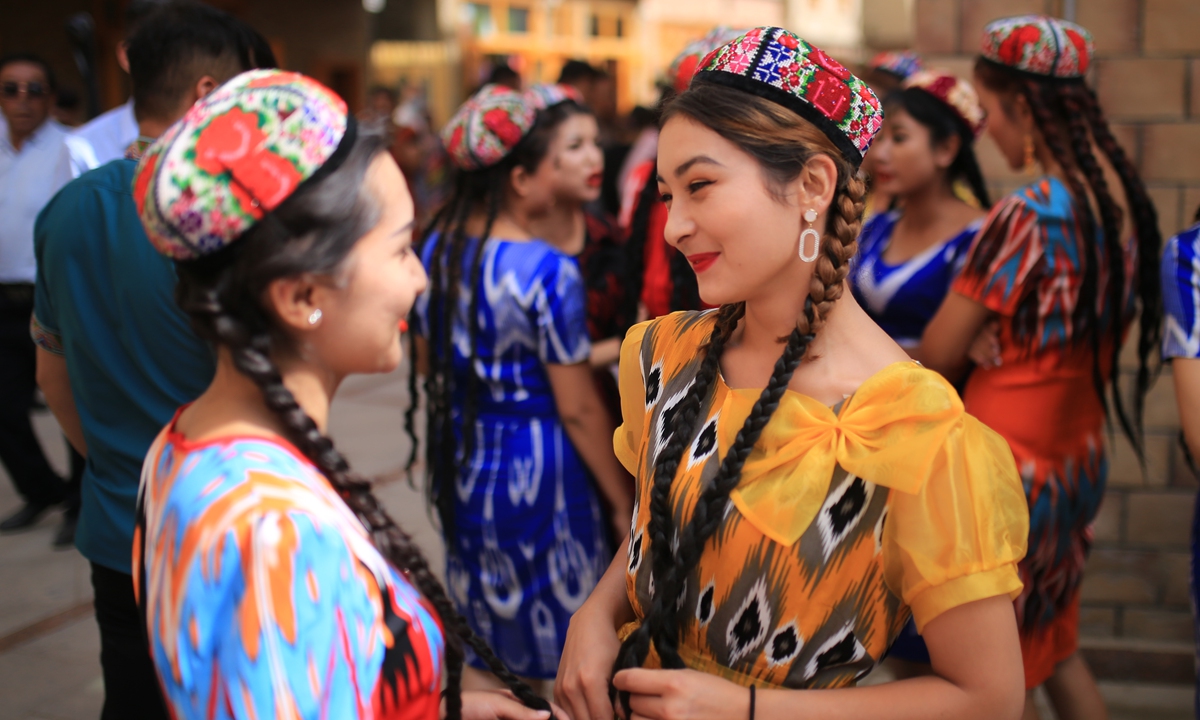
Women in traditional garb chat during a break from a group dance during the Corban Festival in Hotan. Photo: Liu Xin, Fan Lingzhi/GT
Soon after Bachelet's press conference, Chinese Vice Foreign Minister Ma Zhaoxu briefed the media that the visit provided an opportunity to observe and experience first-hand a real Xinjiang amid many sensational palpable lies made by certain Western countries and anti-China elements to fulfill their motives of using the Xinjiang region to contain China.
The current statement is relatively objective as the Office of the UN High Commissioner has an independent mechanism with various experts specialized in different fields to make assessments on China's policies. The West may get a glance of the report and this is also why their attacks on China over Xinjiang topics have reached a new crescendo recently, Zhu Ying, a professor from the Baize Institute at Southwest University of Political Science and Law, told the Global Times.
There is no so-called genocide in China's Xinjiang region and the allegations made by the West are based on various lies. Their opinions cannot represent the international opinion and neither will they make the UN High Commissioner for Human Rights their puppet, Zhu said, noting that the online conference served to dismiss disinformation, introduced the world the nature of her visit and showed the role of the High Commissioner.
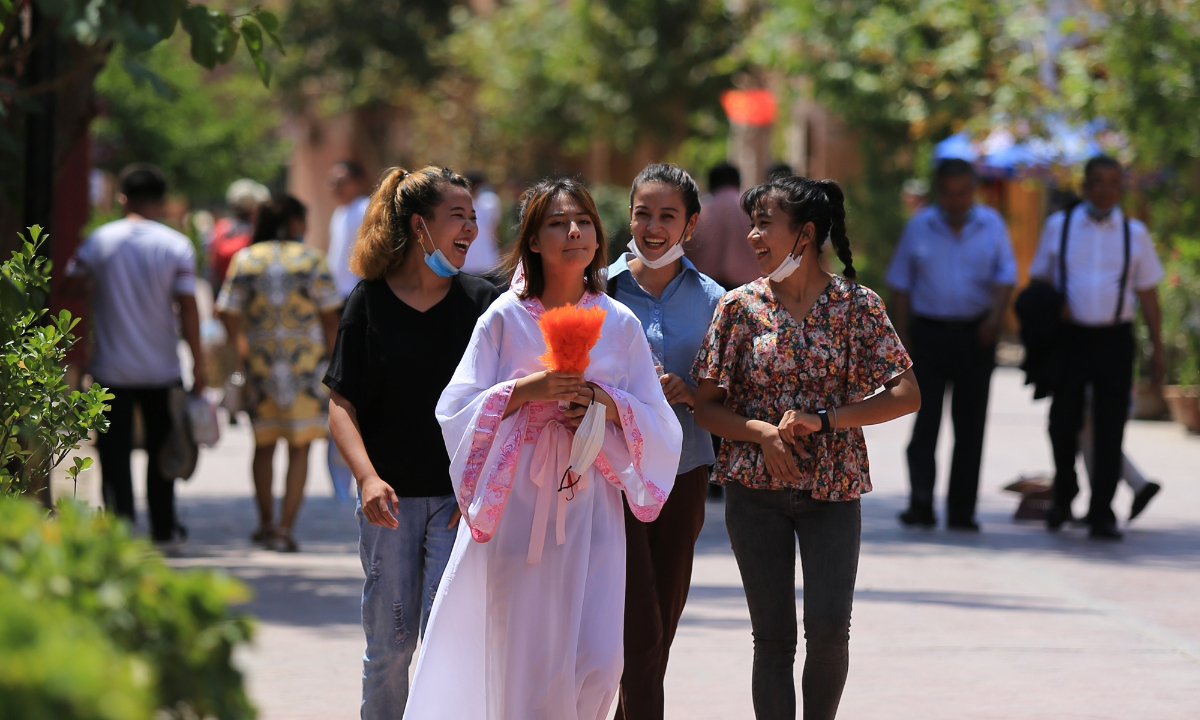
Kashi residents enjoy leisure time. Photo: Fan Lingzhi/GT
Bachelet also noted in the statement that her team was also having discussions with the Chinese government on how national legislation and practices must reflect international human rights laws and standards, particularly in relation to law enforcement and judicial procedure.
Bachelet said she encouraged the government to undertake a "review" of all counterterrorism and de-radicalization policies to ensure they fully comply with international human rights standards.
Zhu noted that this can be regarded as an advice from the UN High Commissioner for Human Rights for combining China's reality with the international criterion on counterterrorism and deradicalization.
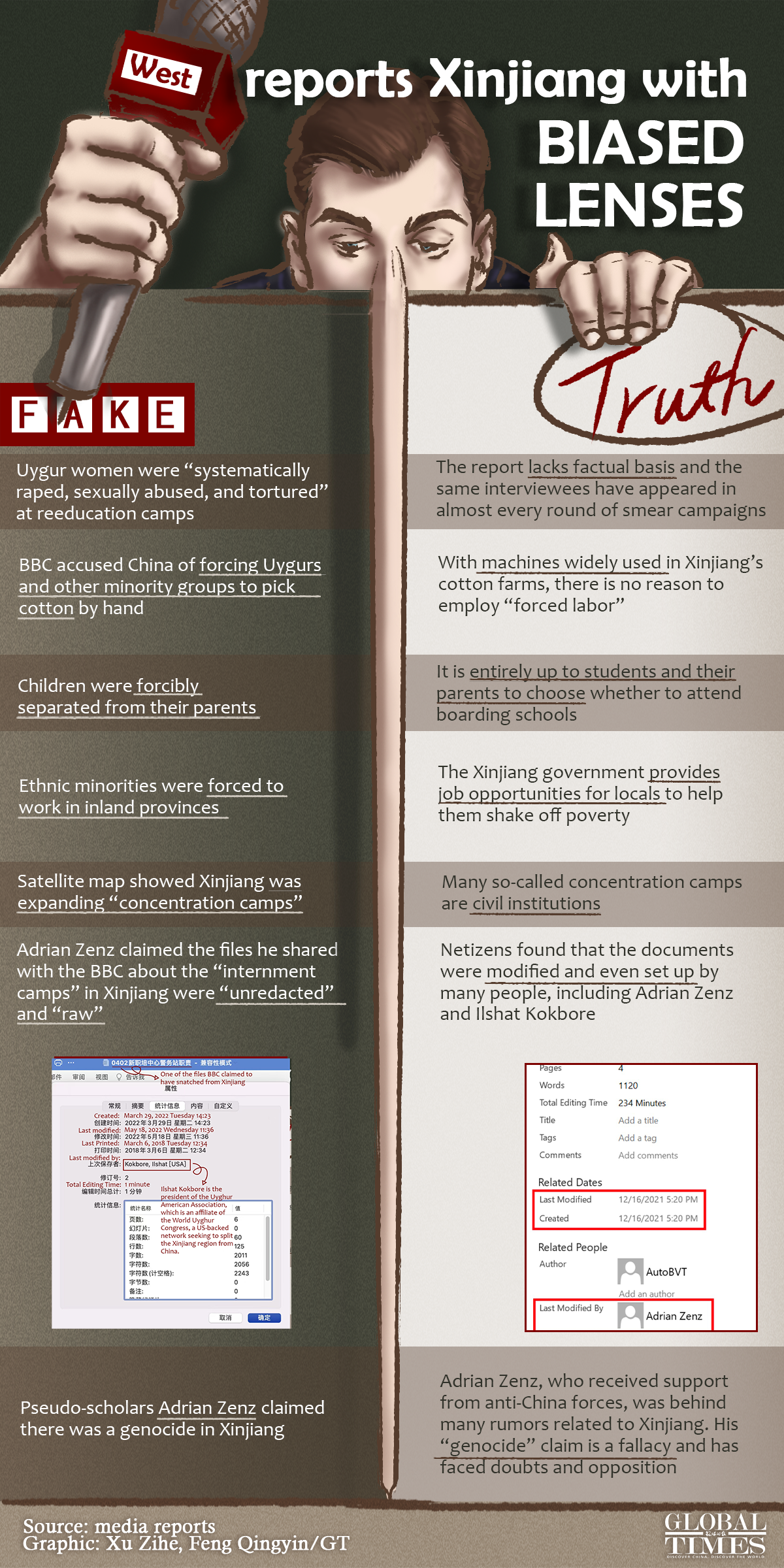
West reports Xinjiang with biased lenses Graphic: Xu Zihe, Feng Qingyin/GT
The Western media are hyping China's "victory" with Bachelet's visit - this is the trap they set for China. Protecting human rights is a country's obligation and there is no so-called winner or loser. China's human rights developments are for its people and if there is a winner, the Chinese people are the biggest winners, said Zhu.
The US and others forces have ramped up efforts to attack Bachelet as they felt worried - after attacking China on Xinjiang for more than three years, their lies are going to be debunked, Xu Jianying, a research fellow at Chinese Borderland Research Institute of the Chinese Academy of Social Sciences, told the Global Times.
Xu noted that just as State Councilor and Foreign Minister Wang Yi said when meeting with Bachelet in Guangzhou on May 23, this trip is "a trip of enhancing mutual understanding, a trip of strengthening cooperation, and a trip of clarifying matters." The development in the Xinjiang region also offers China the confidence to fully displayed its human rights views.
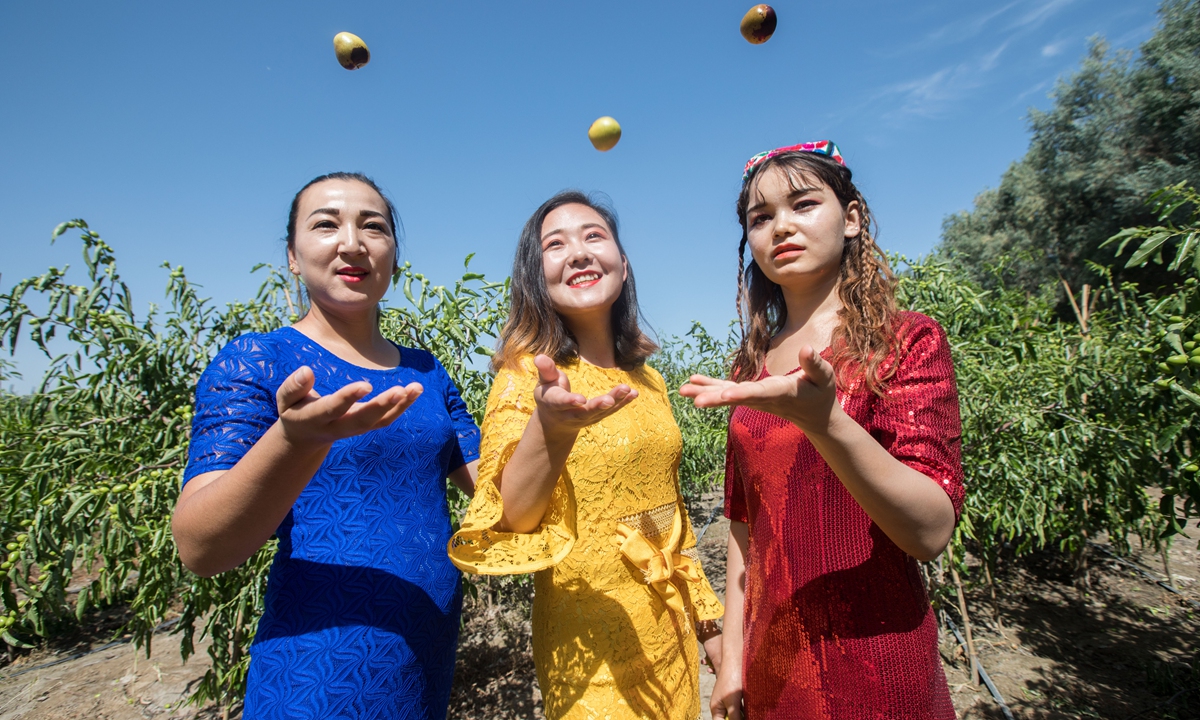
Three women take photos at a winter jujube field in Alar, Xinjiang. Photo: VCG
At Saturday's press conference, Bachelet also said that "It would be presumptuous of me to try to encapsulate the full complexity of this vast country's human rights situation in one statement but allow me to highlight the key topics we were able to discuss at length." Bachelet also briefly introduced China's poverty alleviation and its efforts on supporting the multilateral 2030 Agenda and the Sustainable Development Goals.
However, Xu noted that the tones of the UN may alter given the US pressure but this visit is still a good start for China and the High Commissioner to have more candid communications and for many UN officials to have a better understanding of the Xinjiang region.
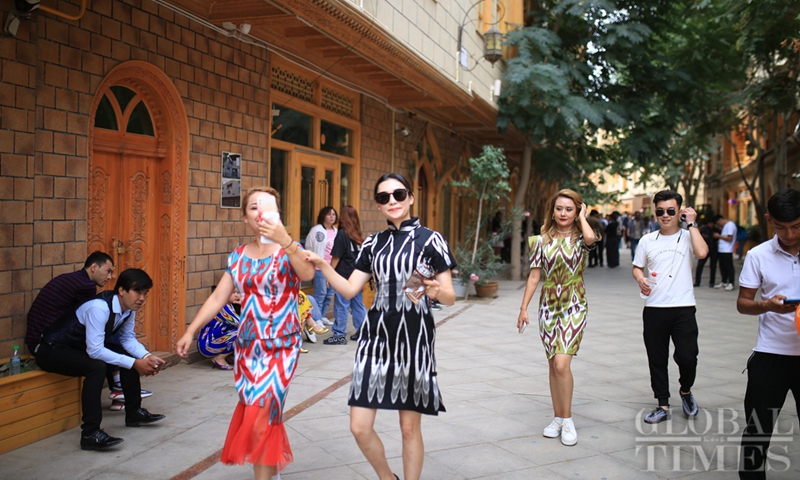
Photo:Fan Lingzhi
Bachelet also noted that the Chinese government and the Office of the UN High Commissioner for Human Rights agreed to establish regular engagement and have a working group to facilitate substantive exchanges and cooperation through meetings in Beijing and in Geneva.
Bachelet said that this visit was an opportunity to raise and discuss concerns directly with China and it "provides an opportunity for me to better understand the situation of China" and the main outcome is "we had the possibility of discussing at the highest level" with the Chinese government.
However, the attacks from the West on Xinjiang will not stop, analysts said.
The US is not interested in the truth about Xinjiang, but only wants support for its big lie about Xinjiang. The lies about Xinjiang "will no doubt continue" since the underlying purpose is to "undermine and discredit China," William Jones, the Washington Bureau Chief for the Executive Intelligence Review and non-resident senior fellow of the Chongyang Institute for Financial Studies at Renmin University of China, told the Global Times.
"But that is not always the case. If reality becomes more and more manifest, with more visitors to Xinjiang, more coverage of life there, and more Uygurs active in the sciences and social sciences in China, the 'liars' then begin to be seen as obsessed individuals who would best be served by a visit to a good psychiatrist," said Jones.
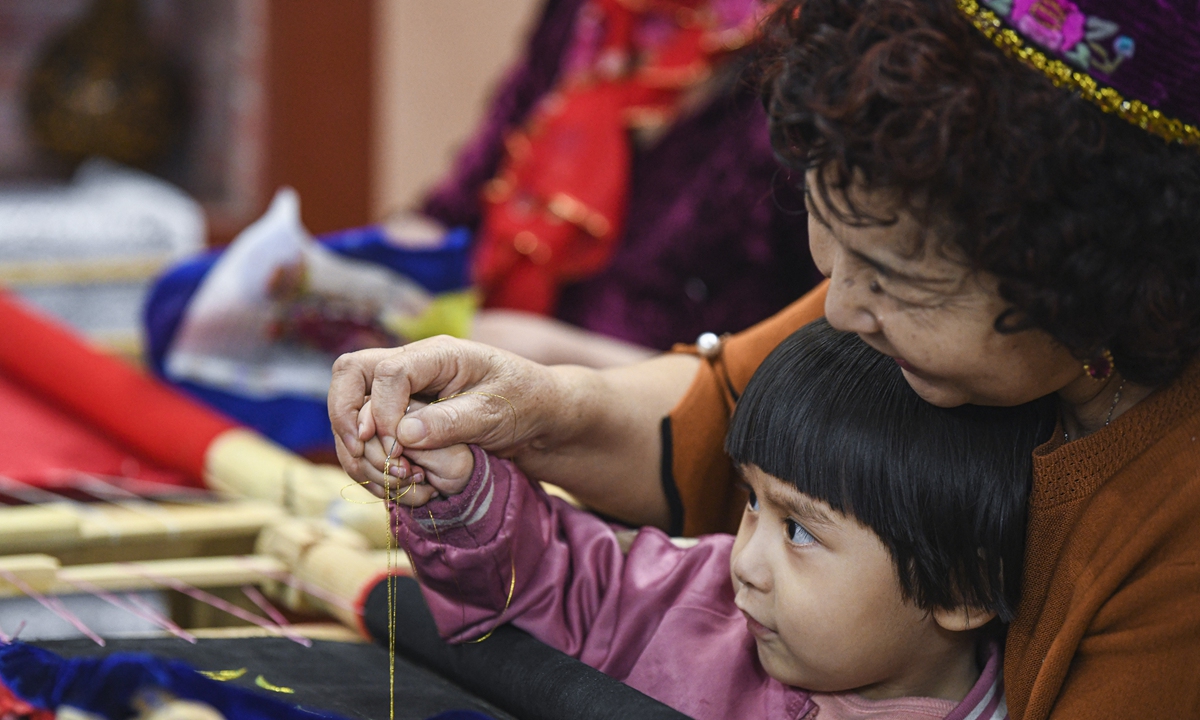
An embroider teaches her granddaughter embroidery skills in Hami, Northwest China's Xinjiang Uygur Autonomous Region on March 19. Photo: Xinhua
While the human rights chief was in China for a visit, a gun shooting tragedy that took place at a primary school in the US, killing at least 19 children, has exposed the severe racism and human rights violations of the US and also shocked the world as many observers criticized the incident.
In response to a question on whether the Office of the High Commissioner will have an investigation on the US' human rights violations, Bachelet noted that they have presented a report at the Human Rights Council on radical discrimination and problems of law enforcement in many countries, including the US and Europe.
Bachelet said that in order to stop racist discrimination, countries need to look at the history of slavery and dismantle all of the systematical discrimination if they really want to ensure the rights of minorities.
She noted that "We will continue monitoring and reporting every time it is needed because unfortunately, we still see many killings… the Killing in Texas was very sad. It shows that the problem is not solved and everybody is to continue struggling against racial discrimination."
People who believe that they are superior to others and who feel they have the right to kill other people, but they are not, said Bachelet.











